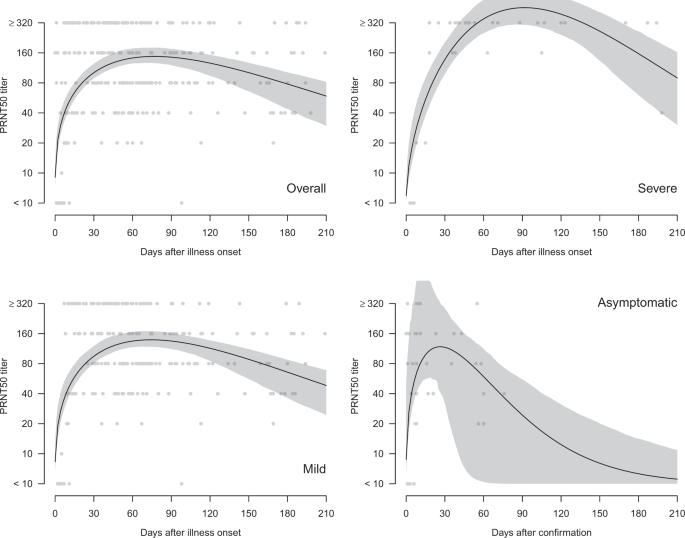New Nature Communications paper suggests robust neutralizing antibodies after COVID-19 recovery
- Jeffrey Morris

- Jan 5, 2021
- 2 min read
Updated: Jan 6, 2021
A paper just published in Nature Communications yesterday measured neutralizing antibody levels in 195 individuals with PCR confirmed SARS-CoV-2 infections collected between 0 and 209 days after onset of symptoms.
Looking at neutralizing antibodies rather than just any antibodies is important because it focuses on those most relevant to immune response. The gold standard for measuring neutralizing antibodies is a technique called "Plaque Reduction Neutralizing Test", in which the blood serum from the subjects is mixed with active SARS-CoV-2 virus and the quantity of serum required to reduce viral levels by 50%, PRNT50, and by 90%, called PRNT90, is measured. This number quantifies how much neutralizing antibody is present and how effective it is in neutralizing virus. The two figures from their papers are found below, split out by severe, mild, or asymptomatic disease and demonstrate durability of neutralizing antibody levels.
Their results found that at 61 days, 99.1% retained detectable neutralizing antibody levels, and conservatively estimated that it took roughly 10-12 months, 10-14 months, and 3-4 months for individuals with severe, mild, and asymptomatic disease for the neutralizing antibody levels to drop below the detection limits. They emphasize that it is normal for antibody levels to eventually wane, but that immune memory allows a rapid antibody response after re-exposure to the virus, typically strong enough to at least prevent severe disease.
These results provide more encouragement that most recovered individuals maintain a vigorous immune response after recovery and that those with severe or mild disease maintain neutralizing antibody over the first year, but that those with asymptomatic disease may have shorter-lasting immune responses. This should provide some reassurance against the worries about reinfection probability, and the hope that an annual vaccination schedule may be sufficient to keep the virus under control.
But looking at the raw data, you can see that there is variability in these numbers across individuals, and some subset of previously infected do not have neutralizing antibody levels as high or enduring as others, so it is always a good idea for recovered people to still take mitigation precautions, and to eventually be vaccinated when they get the chance.
Update 1/6/21: By the way, another paper came out today in Science studying immune response after recovery from SARS-CoV-2 infections with 188 individuals, most with mild disease, and 43 of whom had samples taken between 6-8 months post symptom onset, studying antibody, T-cell and B-cell levels. They found 98% had antibodies for spike protein at 1 month, and 90% at 6-8 months, and same for neutralizing antibodies, so this supports the notion of reasonably durable immunity, and corroborates the notion that most individuals with mild disease detectable antibody levels for at least 6 months post-infection. They also found that development of B cell memory, which enables fast production of antibodies during future exposures once the original antibody levels wane, was evident nearly all samples and appeared to be long lasting.









Detailed and practical, this guide explains concrete rebar in a way that feels approachable without oversimplifying. The step by step clarity is especially useful for readers new to the subject. I recently came across a construction related explanation on https://hurenberlin.com that offered a similar level of clarity, and this article fits right in with that quality. Great resource. explanation feels practical for everyday rauhaneusers. I checked recommended tools on https://www.eljnoub.com
s3udy
q8yat
elso9
Valuable content and presentation <->} Crown Town Pune {} Ravet Crown {} Nigdi Crown {} Wakad Crown {} Marunji Crown {} Hinjewadi Crown {} Pcmc Crown {} Baner Crown {} Aundh Crown {} Pimple Saudagar Crown {] Shivaji Nagar Crown {] Kalyani Nagar Crown {} Viman Nagar Crown {} Koregaon Park Crown {} Kharadi Crown {} Magarpatta city Crown {] Deccan Crown }{ {] Bavdhan Crown
it’s an absolute must-read ! Link.. I appreciate you sharing such thoughtful content. LINK
Aundh Link
Hinjewadi Link
Wakad Link
Baner Link
Ravet Link
Balewadi Link
Pimple Saudagar Link
Shivaji Nagar Link
Koregaon Park Link
Viman Nagar Link
Magarpatta Link
Bavdhan Link
Main Pune Link
Kothrud Link
Pimpri-Chinchwad Link
Best In Pune
The Real Pune Service I chose possessed a remarkable combination of charm, intellect, and beauty. From start to finish, the service was flawless, and I felt completely at ease the entire time.
This is encouraging news! It's great to see research showing lasting neutralizing antibodies after COVID-19. I wonder if this knowledge helps with making choices in Shindo Life Wiki . Hopefully, annual vaccinations will be enough to manage this virus.